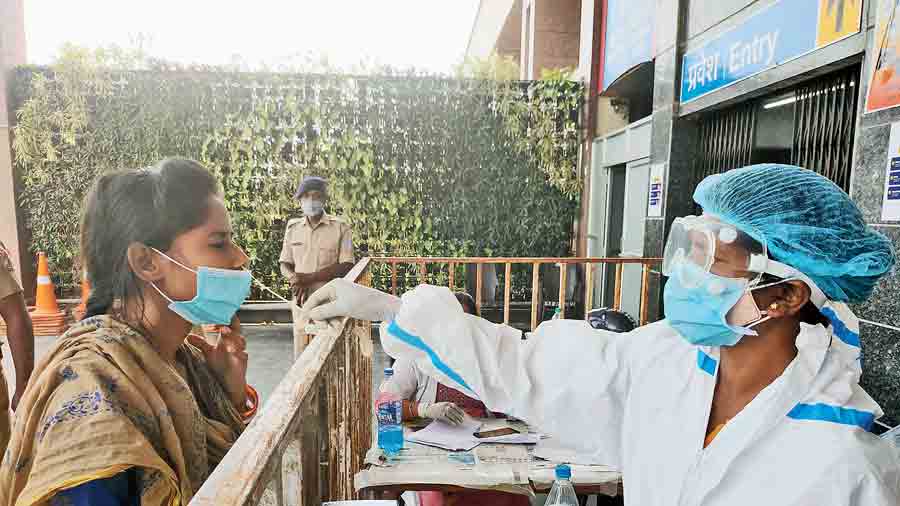Delhi state authorities plan to enforce through a Rs 500 fine a precautionary mask mandate in public spaces amid rising Covid-19 infections in multiple states that experts believe are driven by new coronavirus sublineages and widespread public defiance against precautions.
The Delhi Disaster Management Authority this week set up three enforcement teams to fine offenders nearly two months after 89 per cent of sampled Delhi residents and 91 per cent sampled across India reported most people do not wear masks.
The seven-day average daily new infections nationwide rose 16-fold from around 1,200 cases on April 1 to over 16,000 by June 30. Since then, it has ranged between 15,000 and 19,000 daily cases with significant surges in Delhi, Maharashtra, Karnataka, Kerala, Odisha, Tamil Nadu and Telangana.
Delhi’s average daily new cases increased 1.8-fold from 802 during the week ending July 29 to 1,498 during the week ending August 5.
Eight Delhi districts have test positivity rates greater than 10 per cent. Test positivity rates need to be as low as possible, ideally below 5 per cent. Five districts each in Kerala and Maharashtra and 24 districts in Karnataka also have positivity rates exceeding 10 per cent.
The Union health ministry and state public health authorities have consistently advocated the use of masks in public spaces alongside other precautions such as hand hygiene and physical distancing. But some doctors have questioned the so-called mandate without enforcement.
“How many would pay income tax if it is made optional? A mask mandate shouldn’t be viewed as an act of aggression or harassment, but as a deterrent,” said Rajeev Jayadevan, a physician in Kochi and co-chair of the Indian Medical Association’s task force on Covid-19.
Scientists involved in sequencing coronavirus genome samples say the rise in infections appears to be driven by sublineages of the omicron variant.
“We’re seeing several omicron sublineages circulating, in some ways competing with each other,” said Rajesh Karyakarte, professor and head of microbiology at the BJ Government Medical College, Pune. They are called BA.2.75, BA.2.76, BA.5, among others.
Karyakarte, whose lab is among 38 nationwide involved in sequencing coronavirus genomes, said clinical observations so far indicate that while the sublineages are causing infections in vaccinated people and in those with previous infections, prior immunity is protecting people from severe disease.
At the Pune college, Karyakarte and his colleagues tracked the clinical progress of a series of 75 patients, each infected with BA.2.75 and found that all patients had mild illness.
The death toll from Covid-19 continues to rise daily — 54 deaths were recorded on Wednesday. But public health experts say almost all the deaths are among those with underlying health illnesses or among the unvaccinated.
A medical expert said that while masks will “most definitely” lower the risk of catching the infection, the sublineages are so widespread and transmission potential so high that letting guard down even for a few minutes could lead to infection.
“It could happen in a park or in a restaurant — when masks are off,” said the expert who requested not to be named. “People need to voluntarily adopt face masks and other precautions.”











